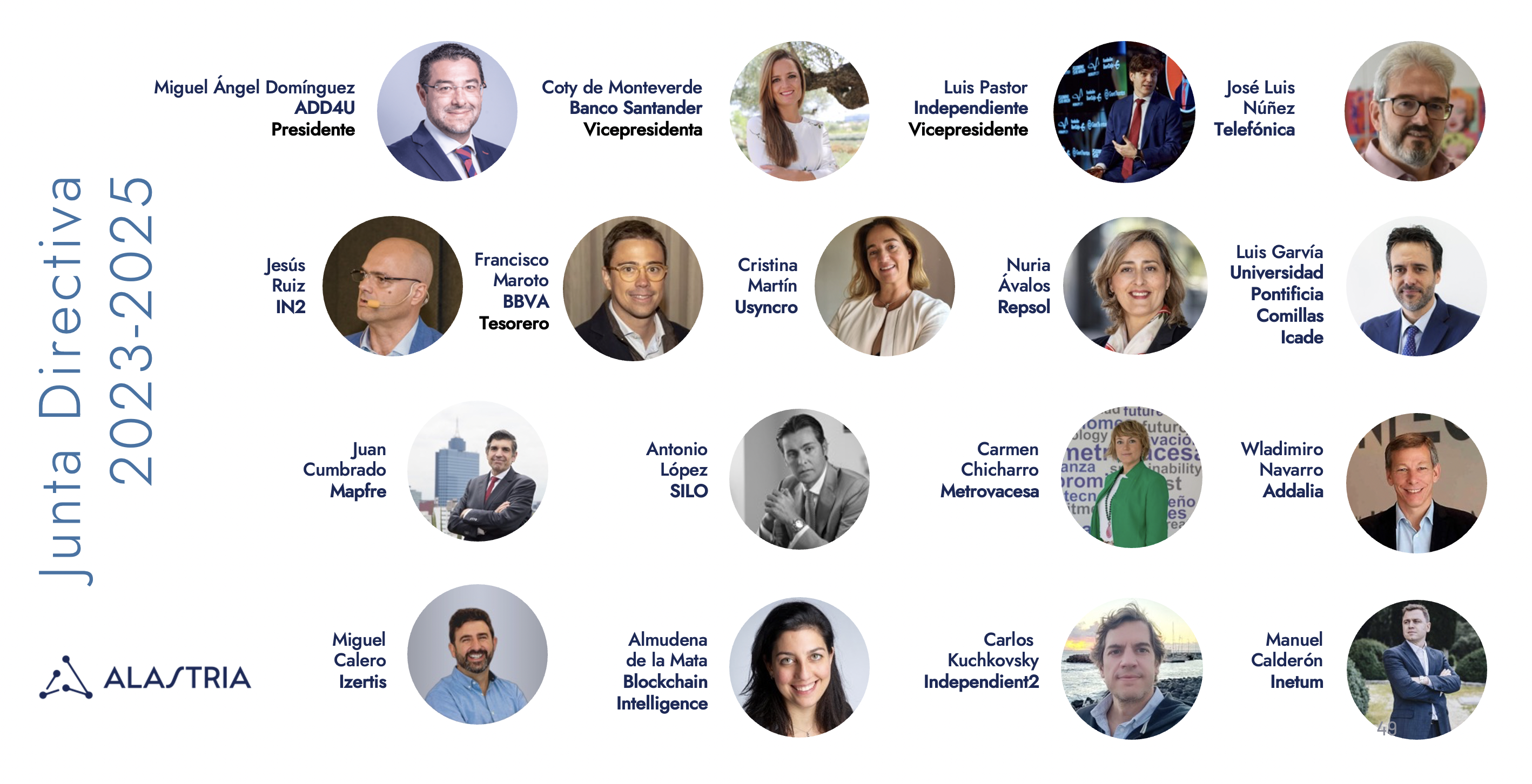Madrid, June 23, 2023.- The materialization of public-private collaboration in projects in Spain and the strengthening of Alastria’s international position were two of the most important milestones in the management balance that Alastria presented during its Ordinary General Assembly, which brought together a large number of its associates at the APD space and in hybrid mode.
The Assembly was the framework for the renewal of the new Board of Directors, which will be chaired for two more years by Miguel Ángel Domínguez (Add4u). In his speech, the president of Alastria emphasized the focus of the association for the coming period: project implementation. “These last two years we have worked on consolidating the strategy of fostering public-private collaboration, and achieving joint work with the central government, regional governments and local governments allowed Alastria to be able to access initiatives that improve the results of projects and blockchain technology. Now comes the stage of execution, implementation and justification of these projects so that public administrations continue to rely on this technology.”
Along these lines, Alastria’s president highlighted the collaboration with SEDIA, the Community of Madrid, the Community of the Canary Islands and the Principality of Asturias for the project to build Spain’s blockchain infrastructure, ISBE, where production use cases can be deployed and which will be aligned with the European blockchain infrastructure. This project is one of the first 11 flagship digital transformation projects selected under the RETECH program.
Coty de Monteverde (Banco Santander) and Luis Pastor (independent) repeat in the vice-presidencies of the Board of Directors, and will be accompanied by Manuel Calderón (Inetum), Francisco Maroto (BBVA), who will also serve as treasurer; Jesús Ruiz, (IN2), José Luis Núñez Díaz (Telefónica), Nuria Ávalos (Repsol), Luis Garvía (Universidad Pontificia Comillas), Carmen Chicharro (Metrovacesa), Antonio López (Silo), Juan Cumbrado (Mapfre), Almudena de la Mata (Blockchain Intelligence), Miguel Calero (Izertis), Cristina Martín (Usyncro), Carlos Kuchkovsky (independent) and Wladimiro Navarro (Addalia). The Secretary of the Board of Directors will be María González Gordon, from CMS Albiñana & Suárez de Lezo.
Alastria has consolidated as one of the largest public-permissioned, multi-sector blockchain platforms in the world, oriented to the development of blockchain in a responsible, trustworthy and regulation-aligned way. It is formed by more than 500 partners of different sizes and sectors -47% of them SMEs and also the extended Ibex companies- the academic world (universities, business schools, training centers, technology and science parks) and public administrations. One of its main lines of work in these last two years has been the identification, promotion and boosting of productive use cases, supported by the level of technological maturity that blockchain has reached and the arrival of regulation around DLTs, with MiCA and the Pilot Regime in Europe and the Securities Market Law and the financial sandbox in Spain.
Within the results, Juan Jimenez Zaballos, CEO of the association, highlighted the internationalization of the association and the deepening of the link with European initiatives: “We have been able to position Alastria as an implementation partner of various European projects in different formats, but always with the common goal of solving real problems through distributed technologies,” he said. There are currently partners of 20 nationalities participating in Alastria, although the majority of partners are from Spain. This is a sign of the prestige of the ecosystem in the international arena and reflects the geographic diversity present in the partners. The participation in several European projects via consortium, including Trublo, Trustchain and DOME, are also an example of Alastria’s relevant position in Europe.
Another achievement of the period has been the evolution of the Alastria ID identity model, which presented its MVP 2.2.0 in the testing completion phase, and the Alastria EPIC (Enhanced Privacy Identity Concept) version, whose prototype has been released in the first quarter of 2023 and enriched with the Reference Framework Architecture (RFA) that sets the technical parameters of the European digital identity. With this model, Alastria’s digital identity is aligned with eIDAS2 and improves privacy requirements. In terms of networks, the partners continue to robust the ecosystem’s blockchain infrastructure, with networks on Quorum (now reaching 200 nodes), on Hyperledger Besu (which has doubled the number of regular nodes to 40) and experimentation on Layer 2 networks with Polygon.
Finally, Alastria’s CEO highlighted the positive momentum blockchain is experiencing. “After the cleanup process that occurred in the blockchain community with the bankruptcies of large operators and crypto instruments in the United States and motivated all of them by management, design and internal governance flaws, we have detected in the ecosystem a growing and renewed interest in Blockchain as an underlying infrastructure technology and its intersection with other exponential technologies such as AI and IoT, fostering the appropriate regulatory anchor.” This, along with related regulation in the crypto and DLT world, is imprinting traction on productive cases, especially tokenization and expressions of digital assets, which will give new impetus to the use of the technology and its potential as an enabler of economic growth.
